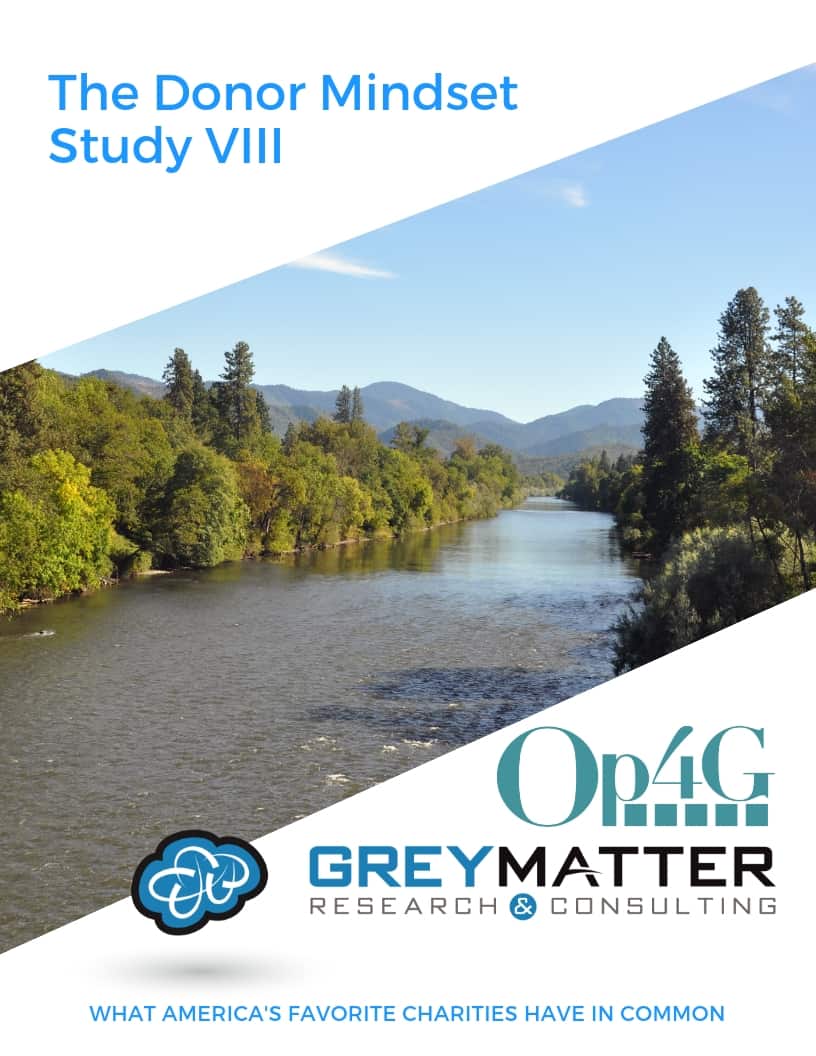
What Defines America’s Favorite Charities?
America’s favorite charities – the organizations people would support if they could only support one. Few Christians name a faith-based organization as their favorite charity…American donors are taken with massive non-profits…and more we learned from asking Americans about their favorite charity.
If you could only support one charity…
…which one would it be?
Grey Matter Research and research panel Opinions4Good (Op4G) asked 1,000 American donors this question. We then researched every organization mentioned as a favorite: their size, primary cause, overhead ratio, theater of operations, and whether the organization is faith-based. We asked donors to exclude local churches and places of worship from their answers.
Dominant Brands
The study finds quite a number of surprising facts about the charities Americans favor. For one thing, just twenty separate brands account for most-favored status for over half of all American donors (54%). In fact, just five major brands account for 36% of all donors’ favorite organizations:
- ALSAC/St. Jude
- American Cancer Society
- American Red Cross
- The Salvation Army
- UNICEF
These are not by any means America’s largest charities, but the five most likely to be named as the very favorites by American donors.
Going Big
A key conclusion of the research is that Americans tend to favor very large charities. The average total income of the 289 different organizations donors name in the study is $1.1 billion (according to their most recently available IRS Form 990). Even the median figure is quite high, at $399 million. Just 5% of donors have a favorite charity with under $5 million of income; only 23% name one with under $50 million in income.
Large Going Small
One advantage for small organizations is that they tend to attract larger donors. Among donors who gave under $100 during the 12 months preceding the study, only 20% have a favorite charity with income under $50 million. Compare this with 47% who have a favorite with a total income of $1 billion or more. But this ratio starts to equalize as donors give more. It finally reaches 29% favoring small charities and 35% very large charities among donors giving $2,000 or more in the past year.
The Faithful Not Supporting the Faithful
Our third major discovery is that religious people rarely favor religious organizations. The proportion who name a favorite organization that is faith-based is only:
- 18% among donors who self-identify as Christian
- 8% among those who self-identify as some other religion
- 19% among Protestants
- 16% among Roman Catholics
- 18% among those who attend worship services at least once a month
- 23% among those who attend Protestant worship services at least once a month
The vast majority of all donors who regularly participate in religious faith do not have a faith-based organizations as their favorite charity.
Not only that, but organizations for which religion itself is the primary cause (e.g. spreading their religious faith or strengthening the faith of believers, such as a teaching ministry or missionary organization) are the favorites for only 2% of donors who regularly attend religious services.
Favorite Causes and Places
So what do donors favor instead? By far the number one cause among all donors is specific diseases (24%). This is followed by international relief and development (14%), animal welfare (13%), and community development (10%).
Although a majority of donors state a preference for giving “here at home” rather than overseas, 60% name a favorite that operates globally. Just 22% favor one working just within the United States, and only 16% working locally or regionally.
Say One Thing, Do Another
Ron Sellers, president of Grey Matter Research, notes that donors often prefer one thing but then donate in a way that contradicts their preferences. “When donors are directly asked, about half say they prefer supporting smaller organizations and two-thirds want to help ‘here at home,’” Sellers noted. “But then their favorite charities are heavily weighted toward large organizations and those operating globally. It’s a testament to so many of these favored organizations that they have garnered a high level of preference even though they don’t represent the ‘ideal’ organization for many donors.”
Sellers explained that there are many lessons to be learned from the study. “Faith-based organizations need to start asking themselves why so many people of faith are not putting their contributions where their hearts supposedly are. Small organizations need to consider whether their resources are best used trying to build a file of small, mass market donors or going after a more select group of larger donors. And everyone needs to take a look at the few brands that are tremendously strong and dig into what they have done to reach that brand strength and create preference among so many donors.”
The full study examines these donor perceptions more in-depth, with considerable detail. Please e-mail ron@greymatterresearch.com for a free copy of America’s Favorite Charities.
